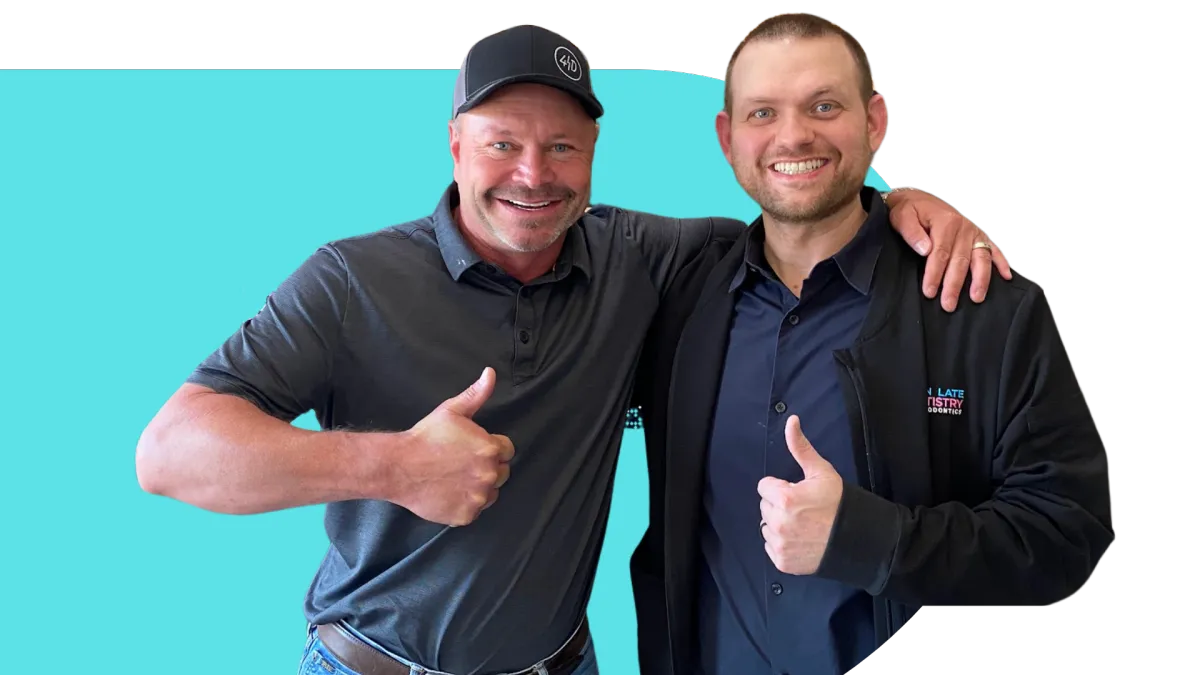
Love Your Heart? Start with Your Gums – They’re Closer Than You Think!

The Research is In: Periodontal Disease Can Double Your Chance of a Heart Attack
400+ 5-Star Google Reviews ⭐⭐⭐⭐⭐
Love Your Heart? Start with Your Gums – They’re Closer Than You Think!
The Research is In: Periodontal Disease Can Double Your Chance of a Heart Attack
400+ 5-Star Google Reviews
⭐⭐⭐⭐⭐



You're unsure about the need for deep cleaning, along with managing discomfort, cost, and time.

❌ You might be wondering why a deep cleaning is necessary.
❌ You may feel anxious about the discomfort or sensitivity during and after the procedure.
❌ The cost of deep cleaning might make you second-guess it.
❌ You might worry about needing more treatments or follow-ups later.
❌ It’s easy to overlook gum disease when you don’t feel any pain.
❌ You may feel stressed about having to schedule several appointments.
Get The Killer Smile You've Been Waiting for.

We make the process of getting your dream-smile easier than ever with a digital process that is revolutionizing the industry of Smile Makeovers.
❌ You might be wondering why a deep cleaning is necessary.
❌ You may feel anxious about the discomfort or sensitivity during and after the procedure.
❌ The cost of deep cleaning might make you second-guess it.
❌ You might worry about needing more treatments or follow-ups later.
❌ It’s easy to overlook gum disease when you don’t feel any pain.
❌ You may feel stressed about having to schedule several appointments.


Catch Gum Issues Early with a Deep Cleaning.
Gum disease can creep up on you—it's worth checking in

SYSTEMIC PROBLEMS:
Gum Disease/Periodontal Disease Strains of Bacteria have been isolated and linked to the following systemic problems for the body including:
Increased Chance of Stroke
Respiratory Diseases
Heart Disease – In a recent article posted by
DentistryIQ.com, researchers found that people with periodontal disease are almost twice as likely to have heart disease.
Diabetes
Erectile Dysfunction
Osteoporosis
Low Birth-Weight Babies and Pregnancy Problems
Why Open Late Dentistry?

Advanced Tech. Better Smiles
"These guys are an amazing team! Always on time, thorough, professional and friendly! All the new technology too. Highly recommend"
Susan D.
⭐⭐⭐⭐⭐

An Environment You’ll Love
"I always have a great experience at Open late dentistry. The environment and the infrastructure is great and the doctor is amazing."
Gokul H.
⭐⭐⭐⭐⭐

Easy Online Booking
"Had a wonderful experience at the Dentist today. The ease of booking an appointment online and the atmosphere were enough to put me at ease. The Dr and staff were both personable which made the process a breeze. I definitely recommend their services at Open Late Dentistry"
Kristin H.
⭐⭐⭐⭐⭐
Check Our Pricing
Ready to find the perfect plan? Explore our transparent rates and choose what's right for you!
Tooth Mobility, or “Wiggly Teeth”, that lead to loss of teeth and extraction/dentures
Root Sensitivity From Bone Loss and Exposed Roots of Teeth
Infection Spreading to Other Healthy Teeth When Not Having Therapy Performed
Having teeth firmly rooted in the bone enough that they can withstand chewing forces while eating for years to come.
Preventing further costs down the road like Gum Surgery and implant supported dentures.
Preventing further costs down the road like Gum Surgery and implant supported dentures.
Laser Pocket Disinfection
Dental Lasers Can Assist in our Soft Tissue Management Protocol by Helping to Rid Your Gum Tissues of Bacteria, As Well!

TESTIMONIALS.
Over 400+ 5-Star Google Reviews
Don't just take our word for it. When it comes to who you trust your dental care with, see what our Celina-area residents are saying about the Open Late Dentistry and Orthodontics Team
TESTIMONIALS.
Don't just take our word for it... When it comes to who you trust your dental care with, see what our Celina-area residents are saying about the Open Late Dentistry and Orthodontics Team
Gum Therapy/Deep Cleaning F.A.Q.'s
What is gum therapy or deep cleaning?
Gum therapy, or deep cleaning, involves a thorough cleaning of the teeth and gums to remove plaque, tartar, and bacteria that can lead to gum disease and other dental issues.

Why do I need a deep cleaning?
Deep cleaning is typically recommended for patients with gum disease, characterized by swollen, bleeding gums or deep pockets between the gums and teeth. It helps to prevent further gum damage and restore oral health.

How is deep cleaning different from a regular cleaning?
Regular cleanings focus on cleaning the surface of the teeth, while deep cleaning reaches below the gum line to clean and disinfect deeper areas where plaque and tartar accumulate.

What happens during a deep cleaning appointment?
During a deep cleaning, we will scale and root plan the teeth to remove plaque, tartar, and bacteria from below the gum line, and smooth the roots of your teeth to help your gums reattach and heal.

Is gum therapy painful?
Most patients experience mild discomfort, but local anesthesia is used to numb the area, making the procedure more comfortable. Any discomfort afterward usually subsides in a few days.

How long does a deep cleaning take?
Deep cleaning typically takes 1-2 hours, depending on the extent of treatment needed. In some cases, the procedure may be split into two appointments for comfort.

How do I know if I need a deep cleaning?
Symptoms of gum disease, such as red, swollen, or bleeding gums, persistent bad breath, or loose teeth, may indicate the need for deep cleaning. A dental exam will determine if it’s necessary.

How long does it take to recover from a deep cleaning?
Most patients experience mild discomfort or gum sensitivity for a few days following the procedure. Proper oral hygiene and following aftercare instructions will promote healing and minimize discomfort.

How can I prevent the need for gum therapy in the future?
Maintaining good oral hygiene—brushing twice a day, flossing daily, and visiting your dentist regularly—helps prevent gum disease and the need for deep cleaning.

Can deep cleanings cure bad breath?
Yes.
Most bad breath results from a proliferation of bacteria in the mouth. Because periodontal disease is a chronic infection harboring millions of bacteria in the deep gum pockets, bad breath is a common symptom. When deep cleanings reduce the bacterial count in the mouth, the problem of bad breath is usually improved.

How long does a deep cleaning take?
The duration of a deep cleaning depends on the condition of your teeth and gums, but most deep cleanings take 1-2 hours.

Food to avoid after a Deep Cleaning
Here are some foods to avoid after a deep cleaning:
Avoid sharp or crunch foods, like nuts and popcorn, for at least 24 hours post-treatment
Avoid hot foods and beverages, like hot soup or hot coffee, for about 48 hours post-treatment
Avoid highly acidic foods, like oranges and tomatoes, for at least 48 hours post-treatment
Avoid spicy foods and alcoholic beverages for at least 48 hours to promote healing

Why choose Open Late Dentistry for gum therapy and deep cleaning?
We offer personalized, gentle care and convenient evening appointments to ensure your gum health is properly managed. Our team is dedicated to making your deep cleaning experience as comfortable as possible.


OFFICE HOURS
TUESDAY: 12:00 PM - 6:00 PM
WEDNESDAY: 12:00 PM - 6:00 PM
THURSDAY: 11:00 AM - 7:00 PM
FRIDAY: 10:00 AM - 5:00 PM
SATURDAY: 10:00 AM - 2:00 PM
(Select Saturdays Only)
Contact Us
TEXT us at: 972-885-9670
















Facebook
Instagram